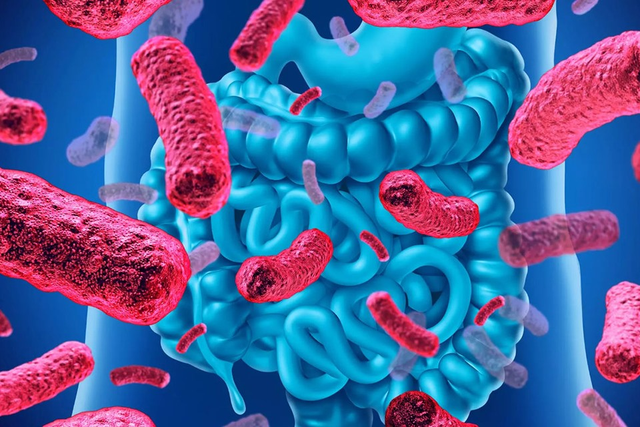 English
EnglishIntestinal microbiota balance
The intestinal microbiota is the totality of microorganisms present in the body’s digestive system. The intestinal microbiota plays an important role in the physical and mental development of children by performing a number of essential functions in the immune, metabolic, structural, and nervous systems of the human body.
1. The role of intestinal microbiota in children
– For the digestive system
The intestinal microbiota helps improve digestive function. During the process of digesting carbohydrates, microorganisms in the intestine produce short-chain fatty acids for the cells of the large intestine to use as an energy source. The production of these fatty acids also stimulates intestinal motility, thereby allowing to regulate bowel movements, reducing the risk of diarrhea or constipation. In addition, the intestinal microbiota also participates in the production of enzymes necessary to synthesize a number of vitamins, including B1, B9, B12 and K.
– For the immune system
The intestine is the largest immune organ in the body with 80% of immune cells. The intestinal microbiota, especially beneficial bacteria, plays an important role in enhancing resistance and maintaining immune balance.
The intestinal microbiota significantly affects the development and physiology of the intestine. They participate in the differentiation process and contribute to the regulation of the intestinal immune system, limiting the growth of pathogenic bacteria and potential pathogenic bacteria by competing for nutrients, occupying adhesion sites, thereby inhibiting the growth and invasion of harmful bacteria. Some strains of intestinal bacteria can secrete antibacterial substances called bacteriocins to inhibit the growth of other bacteria.
– For the nervous system
Several studies have shown that the gut microbiota produces hormones, neurotransmitters, and immune factors that can send signals to the brain directly or through the autonomic nervous system, which the brain uses to regulate basic physiological processes and mental functions such as learning, memory, and mood. Accordingly, the gut microbiota is considered a physical organ that not only helps digest food, but also exchanges molecular signals through the brain-gut axis. This process allows them to communicate intimately with the entire body.

Intestinal microbiota greatly affects health
2. What happens when there is an imbalance in the intestinal microbiota of children?
A healthy digestive system should have a healthy balance of an estimated 85% beneficial bacteria and 15% harmful bacteria. An imbalance in the intestinal microbiota (dysbiosis) occurs when the amount of harmful bacteria increases. This condition leads to many health problems of varying degrees for children.
An imbalance in the intestinal microbiota is accompanied by digestive problems. When the balance of intestinal microbiota is disrupted, the increase in the proportion of harmful bacteria can cause digestive disorders such as constipation, diarrhea, or irritable bowel syndrome, and other health problems.
This condition can cause metabolic disorders and increase the risk of overweight and obesity in children. The intestinal microbiota is considered an essential factor regulating the process of overweight and obesity as it participates in the host’s energy metabolism and maintains homeostasis of the internal environment.
The imbalance of intestinal microbiota affects the body’s digestion and metabolism, which also affects children’s psychology. Constipation or diarrhea, vomiting makes children tired, anxious, scared, leading to mood disorders and sleep disorders.

An imbalance between beneficial and harmful bacteria leads to intestinal dysbiosis.
3. How to balance intestinal microbiota in children
Imbalance of intestinal microbiota causes many negative effects on health, in the long term it also causes many chronic diseases related to the digestive tract. Therefore, ensuring balance for intestinal microbiota in children prevents them from being affected by unwanted consequences. A healthy diet and lifestyle promotes healthy intestinal microbiota and always maintain a balanced state in children. Below are some measures to balance intestinal microbiota in children:
Parents need to build a reasonable diet for their children. The diversity of foods in the diets creates a more diverse intestinal microbiota. This is a sign of a healthy intestinal microbiota.

Healthy diet balances your gut microbiota
Supplementing probiotics for children’s intestinal microbiota to quickly restore balance to the intestinal microbiota, supplementing beneficial microorganisms for the intestines plays a very important role. Supplementing prebiotics, probiotics, and postbiotics into the diet can improve intestinal health.
Prebiotics are a type of fiber that helps nourish beneficial bacteria in the intestines, while probiotics are live bacteria that are beneficial to the intestines. Meanwhile, postbiotics are “a mixture of inactivated microorganisms and their components that provide health benefits to the host”. Postbiotics have good stability, to maintain balance of microbiota (a large group of microorganisms that live in symbiosis in the human body), nourish intestinal cells to avoid digestive disorders and strengthen the natural immune system. Therefore, a good way to balance children’s microbiota is through a healthy and adequate diet to supplement probiotics and postbiotics. Being fed the right foods, probiotic bacteria can produce postbiotics in the body. Parents can increase the production of postbiotics in their children’s bodies through a diet rich in fiber such as fruits, vegetables, and whole grains.,..
In order to bring balance to the intestinal microbiota of children, Nutricare scientists have collaborated with the Nutricare Medical Nutrition Institute – USA (NMNI-USA) to launch the nutritional product Metacare Opti, a pioneer in applying Postbiotics technology, providing 30 billion probiotics (Postbiotic LBiome and Postbiotic L. Lactis Plasma) to inhibit the growth of harmful bacteria, support the enhancement of the natural immune system, thereby enabling the body to fight against the invasion of harmful bacteria, combined with HMO and Fiber to support a healthy digestive system, prevent constipation and support the balance of intestinal microbiota. In addition, with the ingredient 24h Colostrum from the US, the product also helps to increase resistance, support the protection of children’s bodies against pathogens. Metacare Opti has been clinically proven to support healthy digestion, reduce constipation.
In addition to nutritional supplements, parents need to regularly let their children play and exercise to restore balance to their microbiota. When active, the hormone endorphin is stimulated to produce, allowing to reduce stress and increase the activity of beneficial bacteria. In addition, activity in children also makes defecation easier.
The intestinal microbiota plays an important role in the health of young children, creating a protective barrier for the body against risks from external environmental factors. When the microbiota is out of balance, children may have problems related to digestion, resistance, etc. Therefore, mothers should remember to take the above measures to balance the microbiota and at the same time improve the health of children.
References
|
